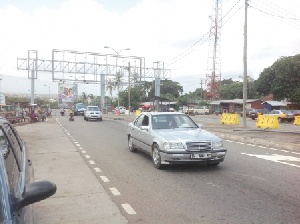The country’s road infrastructure is valued at over US$6billion -- though there remains a deficit in the sector that requires huge financial outlay to address, the Parliamentary Select Committee on Transport has noted in a report.
The Road Fund (Amendment) bill 2016, recently passed by Parliament, has empowered the Fund to borrow on its own balance sheet from financial institutions to meet maintenance needs for the growing road network in the country.
Theophilus Tetteh Chaie, Chairman of the Parliamentary Select Committee on Roads and Transport, noted that: “The road fund generates a little over GH¢300million, and on a yearly basis it spends about GH¢850million to carry out maintenance work. There is a huge funding gap, and as a result we are unable to pay contractors adequately.
“In 2014 a debt of about GH¢300million was carried over into 2015, meaning the Fund is struggling to meet its needs.”
However, with the amendment to the Act, motorists should expect a proactive Fund in maintaining the country’s road network.
As per amendments to the Road Fund bill passed by the 275-member legislature, the Fund is now a body corporate with perpetual succession and common seal. It may sue and be sued, and have in all respects the powers of a body corporate.
The Road Fund was initially set-up under the Road Fund Act, 1997 (Act 536) to finance routine, periodic maintenance and rehabilitation of public roads in the country.
The Fund is also charged with responsibility to assist the Metropolitan, Municipal, and District Assemblies (MMDAs) in the exercise of their functions relevant to public roads under any enactment.
The sources of revenue are the petroleum or fuel levy; bridge, ferry and road tolls; vehicle licence and inspection fees; road user fees, international transit fees paid by foreign vehicles that uses our roads; and such monies as the Minister for Finance in consultation with the Minister for Roads and Highways may determine with the approval of Parliament.
Nonetheless, maintenance of the national road network has over the years been considered not the best -- to the dismay of motorists.
Pressure on the country’s roads has further increased as many working people in Ghana’s capital, Accra, are moving their families to live beyond the toll-booths in places like Malejor, Oyibi, Bawaleshie, Dodowa, Kasoa, Hebron and the like.
By the Road Fund regulations, vehicles owners who drive to work in Accra are required by the Ghana Highway Authority to pay 50 pesewas each time they use the road.
The pre-paid motorists who spoke to the B&FT said they pay about GH¢350 per annum per saloon car on the road.
Commercial bus drivers, pay GH¢1 each time they drive through the toll-booth situated at Amrahia on the Adenta-Dodowa Road. However, the road is in a very miserable state.
Given that many cars cross this particular toll-booth in question every day, it begs the question why the monies collected at this toll-booth are not used to maintain the road.
For many road users, they are mostly troubled with the deplorable nature of the road right where the toll both is sited, as the road -- 50 metres before and after the toll-booth -- is riddled with potholes.
Numerous reports about the sad and unacceptable nature of the road have been utterly ignored by the authorities who superintend collection of the toll and the Ministry of Roads and Highways.
Business News of Wednesday, 30 March 2016
Source: B&FT

















